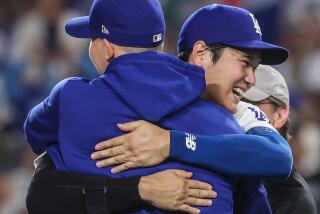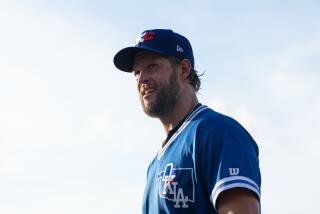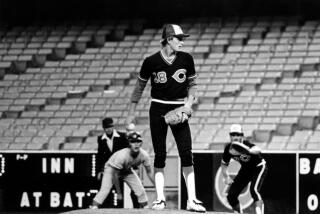Park Gets Double-A’s in Rookie Season : Baseball: Korean pitcher improves English, learns lessons from Hooton with Dodgers’ San Antonio farm team.
Chan Ho Park enters the room, dressed casually, listening to a Walkman. Hard rock, maybe? Korean music?
He places the earphones on the visitor to hear the tape, which turns out to be the same stuff Park had listened to all spring. Another English lesson.
“How are you?” Park asks.
His English has improved dramatically since spring training, when Dodger players did their part by teaching Park such cultural gems as “Hey, dude,” and “Hey, man.” It probably doesn’t hurt, either, that he has recently become addicted to karaoke, singing along daily with his favorite artists.
“Elvis Presley,” Park says, smiling. “And reggae music.”
Tuesday, Park had just finished classes at a school he is attending in Los Angeles, where he studies English four hours daily. He still needs an interpreter most of the time, but there are some questions he answers without any help.
“There will be no more interpreters next year,” Park says through his uncle and agent, Steve Kim. “Tommy (Lasorda) and Peter (O’Malley) want to converse directly with me.”
The language difference was only one barrier last season for Park, a 20-year-old Korean pitcher who was thrust into the spotlight at Dodgertown. His talent was superior, his moves on the mound quirky, his fastball clocked at 94 m.p.h. When camp broke, Park had made the team, becoming the first Korean to play in the major leagues, an honor he cherishes.
But as heady as it all was, it was also soon to be disheartening. Once the season started, he struggled on the mound. He was soon sent to the minors, where he continued to show raw talent but struggled before showing improvement. By the end of the season, Park had pitched more than 100 innings for the first time in his life and was sidelined because of a sore elbow.
That Park handled it all as well as he did was impressive, because it had not been an easy season. When the Dodgers sent him down 15 days after the season started, he thought it would be for only a week or two. But May turned into June and Park was still playing for double-A San Antonio, his Spanish improving along with his English, which was not exactly the reason he was there.
At first, Park didn’t really understand why he was there.
“There were a lot of things Chan Ho didn’t understand,” said Burt Hooton, Park’s pitching coach with the San Antonio Missions. “When he came down, he thought that he was going right back. At first, he didn’t understand the long process.
“Aside from talent, he has much further to go than other kids, with coming over to this country for the first time, not knowing the language, experiencing a different culture, a different diet.
“He struggled here with double-A hitters, and it wasn’t because he doesn’t have the ability, but because he doesn’t have the experience. What I learned is that in Korea, they don’t play amateur baseball all year long like we do over here, so as far as experience and maturity, kids here are ahead of Chan Ho. But talent-wise, he has major league talent--much more than other kids. What he needs to do is learn how to use it.”
Park had a 5-7 record and a 3.55 earned-run average in 20 starts with San Antonio. He struck out 100 and walked 57 in 101 1/3 innings.
He says now he’s glad he was sent down, that it was a great experience for him, but he acknowledges he was depressed and disappointed at first.
“It was difficult down there, a whole new different environment,” Park said. “The weather was hot, but Mr. O’Malley and Tommy kept calling me to see how I was doing, and that really kept me going.”
He lived in an apartment in San Antonio with his interpreters, Don Yi and then Billy Che. Yi, who had been with Park from the time the Dodgers signed him during the winter, had to return to Los Angeles to run his computer business.
“Verbally, people prepared us for the difference between the big leagues and the minors, but boy, were they ever right,” Yi said. “I remember our first road trip, we were sitting in this little bus for about six hours. But we didn’t actually complain to each other too much.”
Kim thought it might help if he sent for Park’s mother, but Park decided against it.
“I wanted my mom with me,” Park said. “But I did not want her to see me in San Antonio.”
Then in late June, Park was pleasantly surprised to see Darren Dreifort, the other Dodger rookie pitcher who had skipped the minors and made the big club. Dreifort, who struggled after a great start, joined Park in San Antonio to work with Hooton.
“When Darren came, he didn’t seem that disappointed about it,” Park said. “I think it is because Darren is more used to the American system. He knows young players usually don’t start in the majors. It was good to see him.”
Meanwhile, Park learned to cook Korean food and found a few Korean restaurants. He even found Koreans, who used to come to the games and root for him.
“I was glad to see Koreans in Texas,” Park said.
He also learned to cook pasta.
“In spring training, the night before I was supposed to pitch, I ate pasta with Tommy and I was able to do well,” Park said. “Tommy came down to San Antonio during the All-Star break and he bought me a pasta dinner that night and the next day, I pitched my best game.
“Pasta is a power food.”
*
The power with which Park propels his fastball is undeniable, but he spent most of the season in denial of his ability to unleash it. When he was with the Dodgers, pitching coach Ron Perranoski would talk with Park about throwing the fastball more, all the while trying to build his confidence. Hooton continued the process. By the end of this season, Park finally began to trust it.
“Chan Ho’s best pitch is his fastball, and he throws it 92 or 93 m.p.h.,” Hooton said. “He started throwing it more and more and showed me he has some raw instincts on how to use it.”
In Korea, Park said, he threw sliders half the time and fastballs the other.
“The slider was my strikeout pitch,” he said. “When I came here I was using sliders, because I wanted the hitters to miss it. I knew American players had power, so if they hit it, it would go somewhere deep. I knew I had a fastball, and knew I had the speed, but I didn’t think it was going to work. But talking to Perranoski and Tommy and everyone, they told me that if I was throwing 95 m.p.h., I should be able to strike out players. Toward the latter part of the season I was able to feel confident that it was working.”
It was also toward the latter part of the season that Park’s right elbow began to hurt, probably because of fatigue. Park has an overgrowth of bone in his elbow, a condition he says was discovered about five years ago. It causes him pain occasionally, but this appeared to be unrelated.
“(Five years ago), surgery was recommended, but I was able to pitch through it so I decided not to have surgery,” Park said. “I saw no reason.”
Frank Jobe, the Dodgers’ orthopedist, examined Park before the Dodgers signed him and saw the overgrowth, but said it was not serious, just something to be aware of.
Kim said an MRI taken this month showed nothing unusual.
“Chan Ho had never gone through seven full months of pitching and never gone over 100 innings, but at San Antonio he did,” Kim said. “So his elbow and arm is not used to going that far. It’s something he needs to learn and has to overcome if he wants to stay in the major leagues.
“I don’t think it is a direct thing from the overgrowth, I just think it was fatigue more than anything. But the overgrowth will be there forever and is something that he is used to.”
Park will soon return to Korea to visit his family for the first time since January. He has become a hero there, Kim says.
Korean journalists heavily chronicled Park’s season, and a recently signed two-year contract with Nike has put him in Korean commercials with Michael Jordan. He will also promote the shoe company in the United States.
“It’s been an amazing year for me,” says Park, who turned 21 in June.
The $1.2-million bonus he received from the Dodgers was sent home to his parents. He said he has bought only clothes for himself, although he wants to buy a utility vehicle.
But what concerns Park about returning to Korea is that he doesn’t want to lose his command of English.
“It is difficult, as far as not being able to speak to him directly, because you don’t know if you are getting your point across,” Hooton said. “He may say, ‘Yeah, I got it,’ but you are not sure.
“But he has the will and the drive, and he certainly has the talent, better talent than probably 99% of the other kids who have come through here.
“I don’t think he knows how good he is.”
More to Read
Are you a true-blue fan?
Get our Dodgers Dugout newsletter for insights, news and much more.
You may occasionally receive promotional content from the Los Angeles Times.










